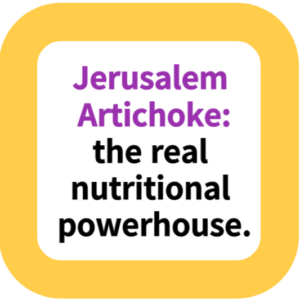Jerusalem Artichoke: the real nutritional powerhouse.
Welcome to our latest blog post where we dive into the world of nutritional powerhouses hidden in plain sight within our vegetable aisles! Today, we’re spotlighting a lesser-known yet incredibly nutritious vegetable: the Jerusalem Artichoke.
Don’t let the name fool you – this tuber isn’t related to artichokes but is a part of the sunflower family. Packed with fiber, potassium, iron, and the prebiotic powerhouse, inulin, Jerusalem Artichokes are a health enthusiast’s dream. Join us as we explore the myriad health benefits of this earthy-flavored gem, from boosting digestive health to enhancing immune function.
Whether you’re a seasoned health aficionado or just starting on your wellness journey, this post is your gateway to discovering the extraordinary benefits of the Jerusalem Artichoke. Let’s embark on this journey of health and flavor together!
Jerusalem Artichoke: the real nutritional powerhouse.

Introduction: Exploring Nutritional Powerhouses in the Vegetable World
In the realm of nutrition, certain vegetables stand out for their exceptional health benefits. These nutritional powerhouses are not only packed with essential vitamins and minerals but also come with unique properties that can significantly contribute to overall health and well-being.
Among these, the Jerusalem Artichoke is a lesser-known yet remarkably nutritious vegetable worth exploring.

: A Misnomer Hiding a Nutritional Treasure
The Jerusalem Artichoke tops our list of nutritional champions. Despite its name, it is not related to the artichoke family. It’s a unique plant belonging to the sunflower species, and it’s the root of this plant that we consume. This tuber has a rich, earthy flavor and offers versatility in cooking, ranging from raw salads to roasted dishes.
The Nutritional Profile of Jerusalem Artichoke
Jerusalem Artichokes are incredibly rich in essential nutrients. They are an excellent source of dietary fiber, which is crucial for maintaining a healthy digestive system. The potassium content in these tubers supports heart health by regulating blood pressure. Iron, another vital nutrient found in Jerusalem Artichokes, plays a key role in oxygen transportation in the blood.
The Role of Inulin in Jerusalem Artichokes
One of the most remarkable features of Jerusalem Artichokes is their high inulin content. Inulin is a prebiotic fiber that nurtures beneficial gut bacteria, essential for good digestive health.
This fiber is not digested in the upper part of the gastrointestinal tract, allowing it to reach the colon where it promotes the growth of healthy bacteria. Regular consumption of inulin-rich Jerusalem Artichokes can lead to improved bowel regularity and a stronger immune system.
Additional Health Benefits of Jerusalem Artichokes
Beyond their fiber content, Jerusalem Artichokes are rich in antioxidants that combat oxidative stress and reduce inflammation. Their low glycemic index makes them an excellent choice for people with diabetes, helping in blood sugar regulation. Also, they contain vitamins such as Vitamin C and B vitamins, which are essential for skin health and energy metabolism, respectively.
Conclusion: Embracing the Jerusalem Artichoke in Daily Diet
In summary, the Jerusalem Artichoke is a true nutritional gem, often overlooked in the vegetable world. Its wealth of fiber, minerals, and prebiotics, along with its versatile culinary uses, makes it an excellent addition to a healthy diet.
By incorporating Jerusalem Artichokes into regular meals, one can enjoy not only their unique taste but also a host of health benefits, ranging from improved digestion to better immune function.


